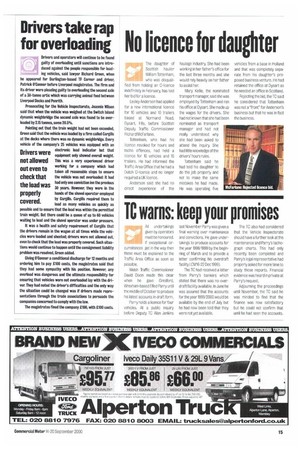Drivers take rap for overloading
Page 17

If you've noticed an error in this article please click here to report it so we can fix it.
Drivers and operators will continue to be found guilty of overloading until sanctions are introduced against the people responsible for loading vehicles, said lawyer Richard Green, when he appeared for Darlington-based IF Corner and driver, Patrick O'Connor before Liverpool magistrates. The firm and its driver were pleading guilty to overloading the second axle of a 38-tonne artic which was carrying animal feed between Liverpool Docks and Penrith.
Prosecuting for the Vehicle Inspectorate, Jeannie Wilson said that when the vehicle was weighed at the Switch Island dynamic weighbridge the second axle was found to be overloaded by 2.15 tonnes, some 20.5%.
Pointing out that the train weight had not been exceeded, Green said that the vehicle was loaded by a firm called Cargills at the docks where there was no dynamic weighbridge. Every vehicle of the company's 25 vehicles was equipped with an electronic load indicator but that Drivers were equipment only showed overall weight.
not allowed This was a very experienced driver working for a company which had OUt even to taken all reasonable steps to ensure check that the vehicle was not overloaded: it had thhad only one conviction inn the previous e load was 30 years. However, they were in the properly hands of the shovel operator employed by Cargills. Cargills required them to covered. load as many vehicles as quickly as possible and to ensure that the load was within the permitted train weight. But there could be a queue of up to 60 vehicles waiting to load and the shovel operator was under pressure.
It was a health and safety requirement of Cargills that the drivers remain in the wagon at all times while the vehicles were loaded and sheeted; drivers were not allowed out, even to check that the load was properly covered. Such situations would continue to happen until the consignment liability problem was resolved. Green added.
Giving O'Connor a conditional discharge for 12 months and ordering him to pay 1100 costs, the magistrates said that they had some sympathy with his position. However, any overload was dangerous and the ultimate responsibility for ensuring that vehicles were not overloaded lay with the driver. They had noted the driver's difficulties and the only way the situation could be changed was if drivers made representations through the trade associations to persuade the companies concerned to comply with the law.
The magistrates fined the company E100, with £100 costs.








































































































